If you’ve been looking for a good book to keep you occupied over spring break, look no further. I interviewed five different people to hear about what they were reading in quick, candid conversations. Their recommendations have something for everyone, from fantasy to autobiography.
From Jaren: The Alchemist by Paulo Coelho
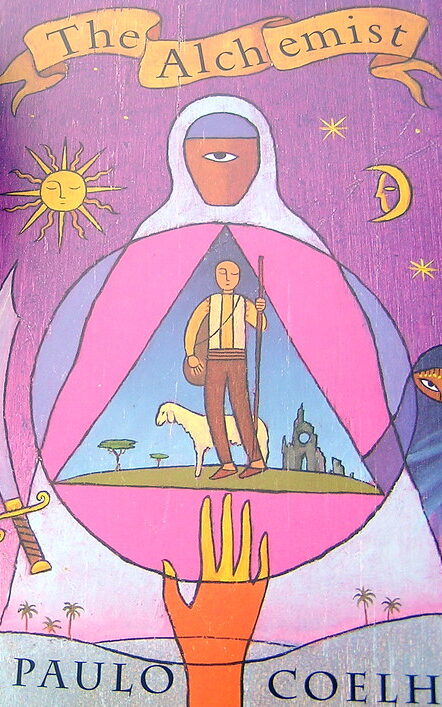
Hadley: So Jaren, what are you reading?
Jaren: I am reading a book called The Alchemist by Palo Coelho.
H: Cool, what’s it about?
J: So right under the title on the front cover are the words “a fable about following your dreams,” and the book is about this boy named Santigo who left home to be a shepherd because he wanted to travel the world. It takes place in the Middle East, I think in the 15th or 16th century. Without giving away any spoilers cuz I think a lot of people should read this book, he basically finds this gypsy lady who says, ‘There’s like your life and fate, everyone’s life and fate build-up to their meaning in life, but it’s individualized, and to really find what you’re looking for, you have to find your treasure and there’s treasure located in the pyramids of Giza,’ and so he goes on this great adventure to go find his treasure, and he learns a lot of wisdom along the way.
H: So, the title The Alchemist, is the genre like magical kind of, or is it more of chemical Alchemy?
J: Umm, it’s more leaning toward the magic side, except it’s more of a spiritual thing. The word Alchemist actually originated from the Egyptian’s because they were experimenting with all kinds of things and these crazy chemical reactions would happen when they mixed, say zinc and copper, and they would blame it on the gods they worshipped, and I can’t remember exactly how the word alchemy came about, but it had something to do with their gods. There’s a lot of religious stuff in this book, but it’s not about that. It’s more about finding your place in the world, finding your place in all the chaos.
H: Okay, so who would you recommend it to? You mentioned that you think a lot of people should read this book?
J: I feel like you should read this book if you’re open-minded to looking at life from a different perspective.
From Savion: The Two Towers by JRR Tolkien
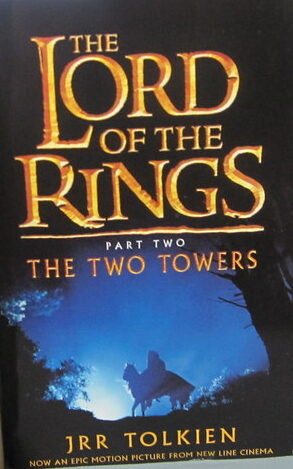
Hadley: So, you said you were reading The Lord of the Rings series, any specific book or do you want to talk about the whole series?
Savion: Well, currently I’m on The Two Towers, which is the second book in the series. I’m down to talk about the whole series or just that book, whichever you’d prefer.
H: Okay, why don’t we just talk about that book and keep it a bit simpler. So, I have not read those books. I’ve only seen the movies. Do you like them better than the movies? Probably?
S: Yeahhh, I’d say they’re certainly more in-depth. There’s also a lot. It feels less overwhelming; the movies are so packed with stuff, whereas the book actually lets you take a breath.
H: So, tell me about the second book, what’s the adventure right now?
S: Well, I’ll try to keep it spoiler-free, but basically someone is no longer in the party who left Rivendell, and most of it is just searching for a bunch of the party who’s been separated. They started off with nine people and lost one, and then they’re looking for another two. And also, Sauron betrayed the good guys, so there’s a lot of conflict about that. Yeah, I’m about halfway through. I’ve actually read this book multiple times. It’s just something to keep me entertained for now…
H: So, is this book and the series one of your all-time favorites, or are you just reading it because you know it’s always gonna be pretty good.
S: I used to really, really love it. I don’t think I love it as much as I used to. My style has certainly changed and my preferences. I would certainly say it’s a good book; I’m just interested in other things now, but it’s still worth a good read.
H: Would you still recommend it to people?
S: Definitely, this is a classic for a reason.
H: I know a lot of people find Tolkien’s writing to be kind of meandering. Do you get bored by it at all or are you constantly entertained?
S: That’s actually a really good point. I would certainly say that he meanders a lot. Sometimes I’ve noticed that my eye will just start skipping sentences; it’s not deliberate or anything- it just happens. I wouldn’t say that I get bored per se. I certainly understand that he just wants to show off this world that he spent a long time creating, but yeah, he certainly diverts a lot from the story.
H: Who might you recommend it to?
S: Oh, um- anyone who’s interested in poetry, fantasy, medieval stuff.
H: That’s a good point. I hadn’t thought of that. There’s a lot of poetry in it.
S: Yeah, I mean every ten or so pages there’s a new poem.
H: Any last words?
S: Yeah, it’s a good book, I don’t have much to say about it, but that’s just because I tried to keep it spoiler-free, which maybe was not a good idea considering this book came out a long long time ago.
H: Yeah I think anyone who’s wanted to read this book has probably read it by this point.
S: Definitely. But, I dunno, there’s always some young person who hasn’t read it yet, but everyone’s seen the movie basically so, yeah.
From Liza: The Secret Keeper by Kate Morton
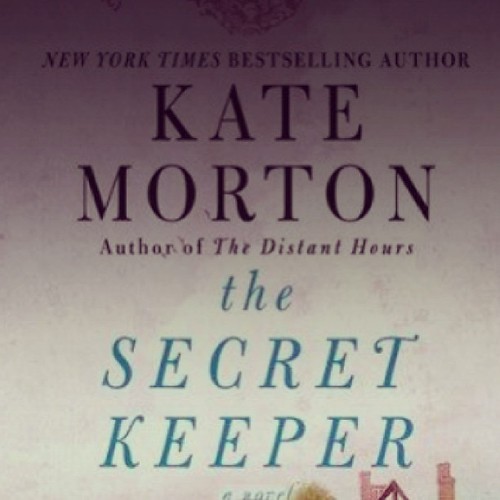
Hadley: So what are you reading?
Liza: I just finished The Secret Keeper by Kate Morton.
Becky: Oh, I like her, I should read it
L: I’d loan it to you but I don’t have it; I just read it on the kindle.
B: Maybe I’ve read it, cause I’ve read a lot of hers, what’s it about?
L: It’s about…
B: The ghost?
L: No- I liked that one; that one was good. This one was kind of intense. It was about a family… Oh, you’re recording me that’s so awkward.
B: Okay, was it good…?
H: Just don’t focus on it.
L: So it was a family, a mother with, like three daughters and a son. Um but she, the mom, kind of came of age during the Second World War, and she, so it’s about the daughter, the oldest daughter in her teenage years, she witnesses her mother… murder someone essentially.
H: Oh god.
B: Uh oh.
L: Um, and you know like, she essentially helps cover it up, but then the family never talks about it again, and then, years later, everybody grows up, and the mother’s, you know, dying. The father’s passed away and the mother’s dying, and so it’s all about, you know, finding out all the…
B: Yeah, that’s how all her novels are, it’s the unraveling of the…
L: Of the…
H: It’s a murder mystery?
L: Yeah, and it, I mean it was intense.
B: She does a really good job of that.
L: She’s really good at weaving characters and stories. Anyway, it had a lot of twists, so it was interesting.
From Becky : City of Girls by Elizabeth Gilbert
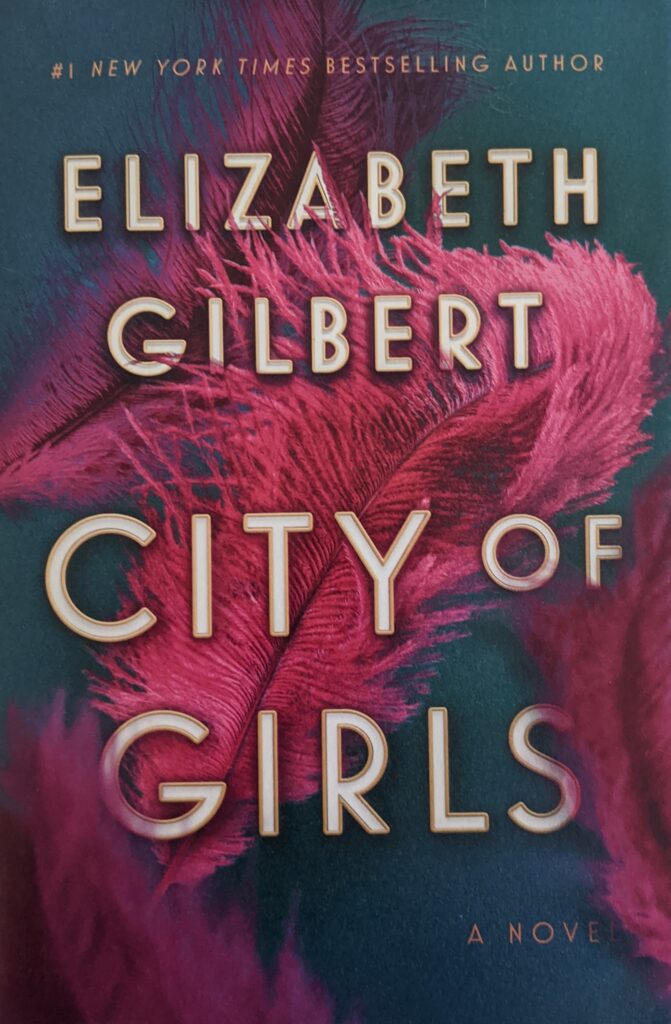
H: So what are you reading?
B: Well I just finished the city of girls by… Gilbert, what’s her first name?
L: Elizabeth
B: Yeah that’s it. And it is about… The moral of the whole book is you can still be a good person and have done bad things.
L: Yeah- that was kind of my moral too.
B: And it’s just kind of an amazing moral to have.
L: Yeah
B: Just like, it really helps you through things. And it tied into her book that I read years and years ago… there’s this one part in Eat, Pray, Love when I think she’s at the ashram, and she goes up on top, and she just says I need to take all my mistakes and just hold them like they’re little kids, just accept all the mistakes you’ve made and just love them, and so that’s what I got out of that book. I mean it’s kind of her theme. And it was a fascinating book. I thought she did a really good job at picking people, characters who, I mean, there were lesbians, you know, turn-of-the-century, when you didn’t talk about lesbians, but her aunt was.
H: When was it, what time period was it set in?
B: World War Two, but in New York City, and she was a total rich kid and had no compass, and she goes and lives with her aunt in New York.
L: At like a playhouse
B: Yeah, at a theatre, and it… she goes nuts, and makes a mistake, and anyway, it’s fascinating. I thought it was a really interesting world view.
H: So is it kind of historical fiction?
B: I mean, yeah- I don’t know how much history is in it.
L: It’s just fiction
B: She did say she did research, so I assume…
L: I mean I think she researched the history of…
B: New York at the
L: Time, yeah,
B: Cause New York goes through a transformation, you know, after they take the theatre down, at a certain point, cause it’s after the war, and they’re rebuilding. You know, it’s like this rebirth and the city changes; they take down whole neighborhoods, and she’s like, this is what it would’ve been like if we were bombed.
L: Yeah
B: It’s just kind of an interesting take.
From Lily K. : For Freedom’s Sake: The Life of Fannie Lou Hammer by Chana Kai Lee
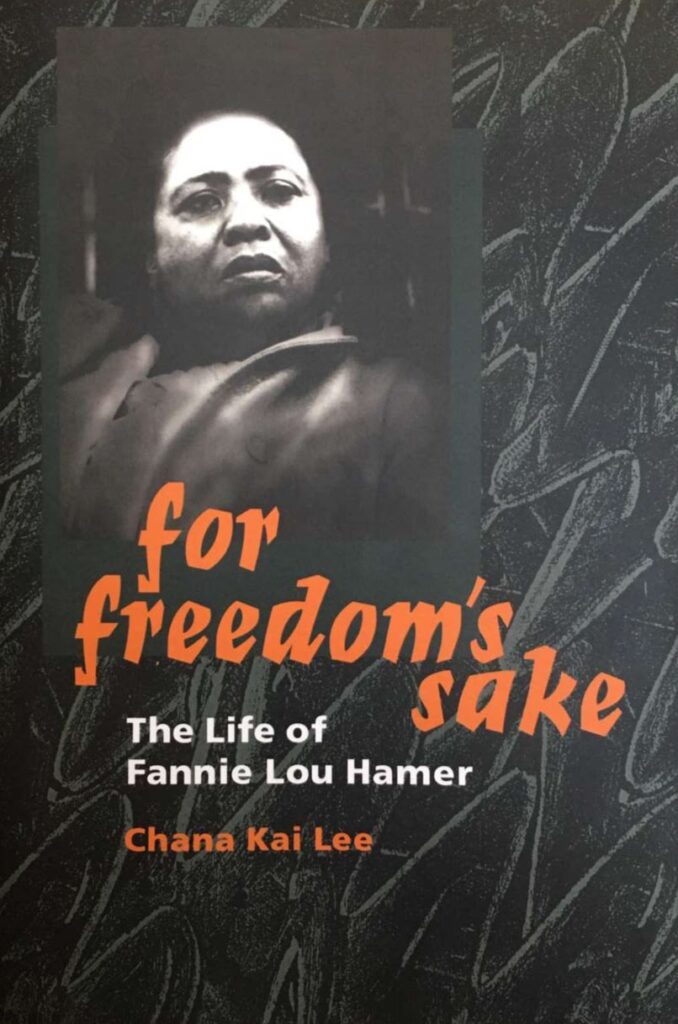
Hadley: So, what are you reading?
Lily: I am reading For Freedom’s Sake: The Life of Fannie Lou Hammer by Chana Kai Lee.
H: What’s it about?
L: Um, it’s an autobiography of a feminist icon, Fannie Lou Hammer, who also did a lot for the civil rights movement, but she, so I’m only like, in the first chapter, but I do really like it so far, but it’s just giving background on what her childhood was like right now. So, her grandmother was a slave and had lots of children because she was raped by a bunch of different white slave owners, and then she had two children that were like by choice, with another slave, and then once slavery was abolished, she and those two children were together. So, then Fannie Lou Hammer, the granddaughter of that slave, she hears about what life was like for her grandmother, when she was still enslaved and how that affected her mother, and how that’s still affecting her. So now she’s working… Her parents are, I’m forgetting what it’s called, do you remember the thing we learned in history last year, it was like when slaves got out they made contracts with farmers so they were basically still enslaved,
H: I know what you’re talking about, um, sharecropping?
L: Yeah yeah, so it tells the story where this farmer comes up to her when she’s like six, and he’s like, ‘hey if you pick 30 pounds of cotton in a week, I’ll take you to the store and buy you all these like sweets and treats and stuff,’ and she’s like ‘oh, good deal, I’ll do it.’ So she picks the 30 pounds of cotton, she gets the treats, and then after that, it’s like, ‘okay, now pick 30 pounds like in a day ,and you don’t get anything.’ So she is just kind of stuck in that. And her father was, like, slightly abusive. He never actually hurt her because her mom was such like a protector of her. So it’s talking about how she’s developing all of these skills for leadership in the very first chapter. It’s basically through what her mother is teaching her of like, being strong, taking care of her family, being proud of like who she is.
H: And what, what time, what year is it set in you know? The 1930s?
L: Mm, I’m not sure.
H: So, would you recommend it?
L: I would… so far I would recommend it. I haven’t gotten too far into it, but yes, I would. Cause I feel like we mostly learn about more figures of the civil rights movement that were more at like the forefront of it, like Malcolm X, Martin Luther King, Rosa Parks, all those people, but there are still a lot of people who did like a lot of work, and she did both, like, feminist work, when that was on the uprise, and work for the civil rights movement.
H: And who do you think would like this book?
L: Well, just people who are interested in that era of the civil rights movement and history and maybe like women’s studies too, because I am reading it for my Women’s History class.

